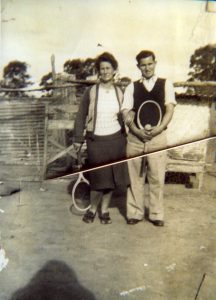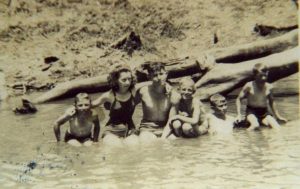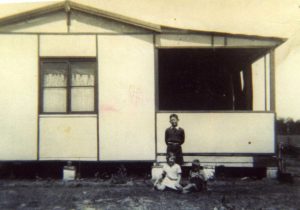by Shirley Cook (nee Wood)
These are my childhood memories of growing up in Creek Street, Riverstone with my parents Jack and Ella Wood and my four brothers, Laurie, Noel (Gravy), Terry, and John (Shota). My grandparents lived over the creek in Clifton Road where they had a chicken farm. Their neighbours were Ernie Sullivan and his family.
My Dad and my brothers all worked at the meatworks at various stages of their lives. Noel was the longest serving, he started in the rabbit department and finished his career in the bacon room.
Dad finished up as a foreman at the Dunheved Munitions Factory near St. Marys. This was where the bombs and ammunition were made and stored during World War 2. After the war this arsenal of ammunition was transferred to the Blue Mountains and stored in tunnels bored into the side of the mountains; the tunnels were then sealed. Dad always vowed he would never live in the Blue Mountains because of this.
Dad loved gardening in his spare time and our back yard was always full of fresh vegetables, he bought his plants from Mr and Mrs Kings’ nursery in Bourke Street. Another feature of our backyard was the honeysuckle vine growing over our outdoor dunny (toilet). The foliage disguised the dunny while the sweet smelling flowers helped to eliminate any odours. We also had a tennis court, surrounded only by a low fence, which meant we spent more time outside fetching tennis balls than we did playing tennis.

Our playground was the area at the back of our home, known as the ‘Flat’, this area is now the training track for the trotters. Here we would build our bonfire every afternoon after school leading up to cracker night in June. The neighbourhood kids – the Jacketts, Donohues and Woods would cut the tree branches off and drag them to where the bonfire was to be built, piling them on top of each other until the bonfire was high enough. When complete the kids would take turns to guard it so no one would light it before cracker night. One year “Toodles” Crowley set it alight before time and no one spoke to him for quite a long time. On cracker night there were screams and laughter as the bonfire was finally lit, it was so exciting with crackers exploding everywhere. When the fire died down we would throw onions and potatoes onto the hot coals and wait for them to cook. I think we ate more ash than potatoes and onions.
There was a well worn track across the ‘Flat’ that was used by the Visocchi, Bennett, Lane, Jocelyn, Mills, Taber, Dawson, Roots and several other families to take a short cut to their homes on the other side of the creek, that was if the creek was not in flood. Speaking of the Visocchi’s the sounding of Mr Visocchi’s bell announcing his arrival in our street brought all the neighbourhood kids running out of their homes to buy his fabulous ice cream. It was delicious, there was no other taste like it.
We used to swim in the creek at the ‘pump hole’ with families such as the Donohues – Shirley, Don, Billy, Johnny, Cynthia and Elizabeth. The Jacketts, and my cousins – Dicky, Kate, Boofa, Ping, Duck and Musso Wood. Even though there were logs and other debris and you could not see an inch in front of you as the water was so dirty, we thought it was great fun.

Going to school meant walking as there were no school buses in those days. If it rained, too bad, we would have to sit all day in school in our wet clothes. If we did not attend school the truant officer would call at home to find out why. We had no help in learning to read, write or do arithmetic as there were no computers or calculators then. We had an ink well set in our desk and we used pens with nibs. We would dip these pens in the ink and write, but if we made a mistake and tried to rub it out, it would make a big mess.
My Dad owned greyhounds. He raced them at the Londonderry and Lithgow tracks with his mates – Bunty Brown (father of Ron and Clevie), Reg Ford, Dodger Stanford and Bub Allen. Dad walked the dogs every morning and my brother Johnny and I had to walk the dogs every afternoon.
I remember Eric Conway delivering the paper to our home in a horse and sulky. In the winter the fog was so thick and a heavy frost would cover the ground, it was real dedication from the Conway family to deliver papers in that weather. I also remember Jimmy Martin delivering the milk in all kinds of weather with his horse and cart.
Going to Rosenthal’s grocer shop to buy sixpence worth of broken biscuits was a ‘big deal’ as I stood at the counter while the biscuits were weighed and put into a brown paper bag. Even our eggs were individually wrapped and placed in my basket where I proceeded home very slowly. Our bread and milk were delivered uncovered, milk in a billy can and bread in a basket, nothing was wrapped or sealed like today. My Dad never sprayed anything on his vegetables, the only problem was the birds that attacked the fruit trees, mainly the figs, maybe that was the reason we never visited the doctor very often as we had no chemicals in our system.
When the cow was milked we always waited to get a squirt of milk into our mouths, then we would skim the cream from the top of the milk to make butter. We would all take turns beating the cream to make the butter as this would take hours.
Push bikes were the main mode of transport getting from A to B. I remember my brothers putting me on the handle bars, it was so bumpy as there were no footpaths and the roads were not tarred. Creek Street only had a few residents – Mr and Mrs Eddie Drake with their daughter Judith who is now Mrs Bruce Johnston, the Izzards, Wiggins, Jacketts, Byrnes, Donoghues and Goldsmiths. At one time ‘Crash” Craddock lived next to us.

Johnny, Shirley and Barry. Photo: Shirley Cook
My mother Ella, my brother Terry and Mrs Sandilands formed a Youth Club in the hall that now houses the museum, it was formed to encourage young people to learn to dance. To raise money they would place a blanket on the floor with a cake in the middle. While Mrs Sandilands played the piano, people threw money onto the blanket, when the music stopped the last one to throw money won the prize (the cake). Another fund raiser was the Ugly Man Contest, the man who raised the most money won from chocolate wheels and raffles won. My brother Terry won when he raised $400 and Jim Packer was second raising $200.
Our house was always full of my brothers’ friends – Cocksie Sullivan, Les Teale, Ralph ‘Skipper’ Martin, Bill Bottle and Merv Fussell to name a few. I remember when war broke out between Australia and Japan. My brother Laurie enlisted in the A.I.F. and was stationed on Thursday Island. His letters telling us of dodging bombs from the Japanese planes were frightening but fortunately he came home unharmed. My uncle, Mick Wood, was in the R.A.A.F stationed in Darwin, he also had some narrow escapes from the bombing of Darwin, but he too came home unharmed.
Residents were instructed to blacken their windows with newspapers, hessian bags or blankets in case the Japanese invaded Australia. We were told the Japanese planes would drop bombs on any light they could see on the ground. One night we were at Charlie Murrell’s picture theatre when the air-raid siren sounded, my brothers and I ran all the way home. Arriving home we huddled around our parents’ bed too frightened to make a sound until the all clear siren sounded.
My Dad and a few men from the town who were too old to enlist would meet behind our place on weekends to practice Army routines. They were known as the CCC and would use tree branches as rifles, they were promised real guns if the Japanese ever landed on Australian soil. They were very dedicated and took the training seriously in all kinds of weather.
I remember our neighbours the Jacketts – with my cousins coming to our house on summer nights. Dad would tell us ghost stories, we were so frightened, no one would go home unless my brothers walked them home. We only had a radio in those days, there was no TV so we made our own fun.
Rugby League was the main sport played in Riverstone and the football ovals were rough. Almost every family in Rivo had someone playing in a team and therefore every match drew a lot of spectators. If you didn’t bring a seat you stood for the entire game, yet no one seemed to mind.
Training was every Tuesday and Thursday night in all kinds of weather. Sometimes the players would be ‘lost’ in the thick fog but the training continued on, even on the bitterly cold frosty nights. Our taps would be frozen on cold frosty mornings and I remember Dad pouring boiling water over the main to start the water flow again.
There was never any crowd violence at these games, only a few mothers running up and down the sidelines with their umbrellas yelling at the referee if their son looked like getting a bad call. My family played a big part in Rugby League in Riverstone. My Dad Jack coached a winning team in the 1940s. My brothers Noel and Terry were selectors for many years and during this time Rivo won many premierships. My brothers, John (Shota) and Terry both played, and Johnny could kick a goal from anywhere on the field. I remember Johnny getting knocked out during a game and he suffered concussion for a week, but that never stopped him from playing the next Sunday. They were tough in those days, Johnny also played in the 1950s in the combined Riverstone-Richmond team.
My mother Ella, my sister in law Phyllis and Mrs Charlie Harris worked as volunteers in the club canteen for many years raising untold amounts of money for the club. After each game a keg of beer was put on in the old club house, the game would be replayed over the keg – the victories celebrated and the losses mourned.
Growing up in a small town like Riverstone has taught me the true meaning of friendships which still continue to this day at our school reunions. Old folk, old friends – forever.
